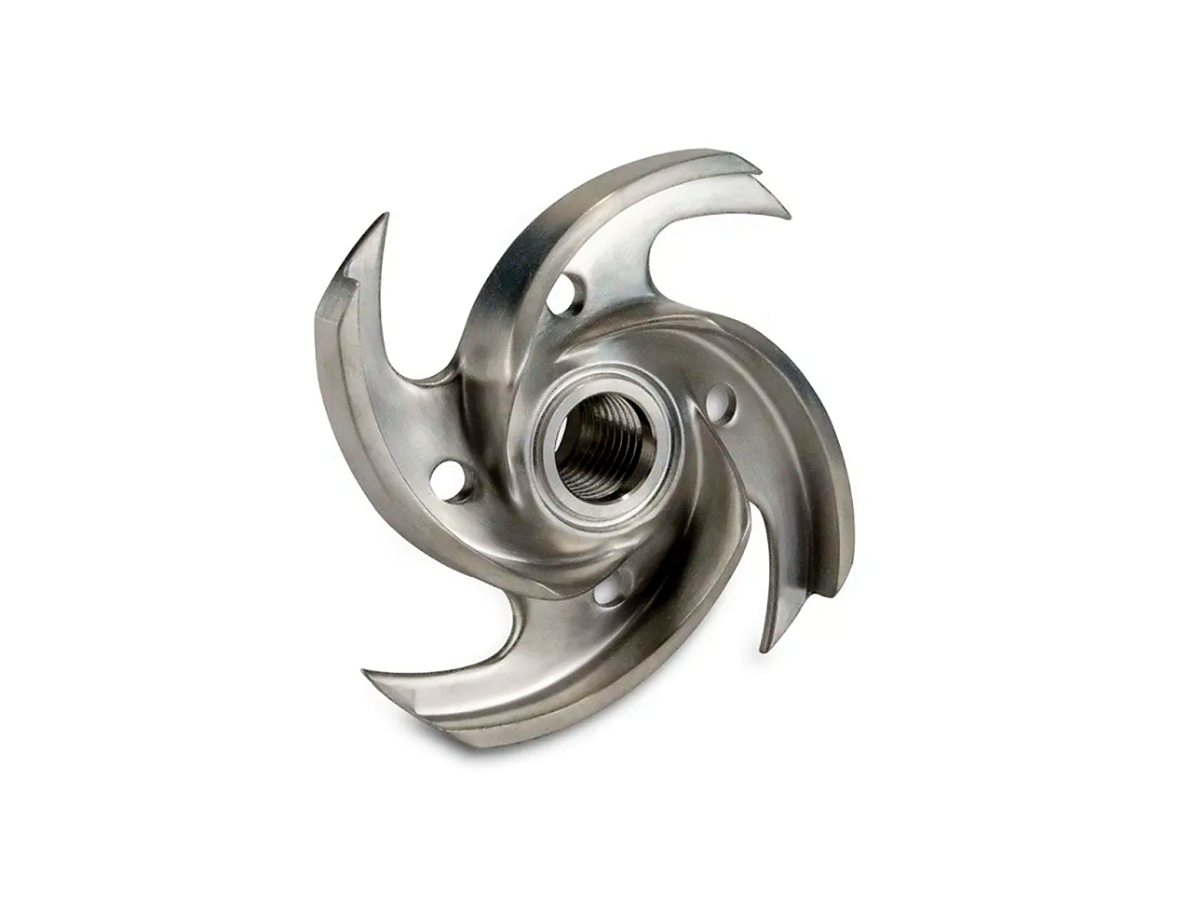CNC Machined Pumps and Valves for Reliable Industrial System Performance
Introduction to CNC Machining for Pumps and Valves
Reliable performance in industrial fluid systems critically depends on precision-engineered pumps and valves. CNC machining, capable of achieving tight dimensional tolerances (±0.005 mm) and high-quality surface finishes (Ra ≤0.8 µm), is ideal for manufacturing these components. CNC machined pumps and valves ensure optimal fluid control, enhance durability, and prevent operational failures, significantly benefiting industries such as industrial equipment, oil and gas, and power generation.
Leveraging advanced CNC machining services, manufacturers deliver consistent quality, improved reliability, and longer service life, even under severe industrial conditions involving pressures up to 1000 bar and temperatures ranging from -50°C to 500°C.
Material Comparison for CNC Machined Pumps and Valves
Material Performance Comparison
Material | Tensile Strength (MPa) | Wear Resistance | Corrosion Resistance | Typical Applications | Advantage |
|---|---|---|---|---|---|
515-690 | Very Good | Exceptional | Chemical pumps, high-pressure valves | Superior corrosion resistance, strength | |
570-700 | Excellent | Moderate | Valve stems, pump shafts | High strength, excellent machinability | |
360-400 | Good | Good | Small valves, fittings | Exceptional machinability, precise tolerances | |
276-310 | Good | Excellent | Lightweight valve components | High strength-to-weight ratio |
Material Selection Strategy for Pumps and Valves
Selecting the right materials for CNC machined pumps and valves involves evaluating operating pressures, temperatures, corrosive environments, and required component durability:
Stainless Steel SUS316 is ideal for chemical handling pumps and valves, providing exceptional corrosion resistance and strength, essential for highly corrosive and high-pressure environments.
Carbon Steel 1045 suits valve stems and pump shafts requiring superior mechanical strength (up to 700 MPa) and excellent wear resistance, ensuring reliability under heavy mechanical stress.
Brass C360 is optimal for smaller valves, fittings, and fluid connectors due to its superior machinability and precise dimensional control, enabling efficient and accurate manufacturing.
Aluminum 6061-T6 is chosen for lightweight valve and pump components that demand high strength-to-weight ratios, excellent corrosion resistance, and good machinability.
CNC Machining Process Analysis for Pumps and Valves Components
CNC Machining Processes Performance Comparison
CNC Machining Technology | Dimensional Accuracy (mm) | Surface Roughness (Ra µm) | Typical Applications | Key Advantages |
|---|---|---|---|---|
±0.005-0.01 | 0.4-1.0 | Valve bodies, pump casings | Complex geometries, high precision | |
±0.005-0.01 | 0.6-1.2 | Shafts, valve stems, fittings | Efficient production, cylindrical accuracy | |
±0.002-0.005 | 0.05-0.2 | Valve seats, sealing surfaces | Exceptional finishes, ultra-high precision | |
±0.003-0.008 | 0.2-0.8 | Complex valves, precision pump parts | Enhanced accuracy, intricate detail |
CNC Machining Process Selection Strategy for Pumps and Valves
Appropriate selection of CNC machining processes ensures accurate, reliable, and high-quality components:
CNC Milling excels at machining complex pump casings and valve bodies, achieving detailed geometries with tolerances down to ±0.005 mm.
CNC Turning is ideal for precise, high-volume production of cylindrical parts such as valve stems, pump shafts, and fittings, ensuring consistent accuracy.
CNC Grinding provides the exceptional surface finish (Ra ≤0.2 µm) and ultra-high precision required for sealing surfaces, valve seats, and other critical contact areas, minimizing leakage and wear.
Multi-Axis CNC Machining is optimal for intricate valve assemblies and specialized pump parts, offering advanced geometric capabilities and precise manufacturing tolerances.
Surface Treatment Solutions for CNC Machined Pumps and Valves
Surface Treatment Performance Comparison
Treatment Method | Wear Resistance | Corrosion Resistance | Max Operating Temp (°C) | Typical Applications | Key Features |
|---|---|---|---|---|---|
Excellent | Exceptional (~1000 hrs ASTM B117) | 400 | Valves, fittings, pump housings | Uniform coating, corrosion protection | |
Moderate | Excellent (~800 hrs ASTM B117) | 250 | Stainless steel valves, pump components | Enhanced corrosion resistance | |
Excellent | Outstanding (~1200 hrs ASTM B117) | 450 | Valve stems, shafts, seals | Reduced friction, excellent hardness | |
Good | Outstanding (~1500 hrs ASTM B117) | 300 | Aluminum pump casings, valve components | Durable finish, superior corrosion protection |
Surface Treatment Selection Strategy for Pumps and Valves
Selecting proper surface treatments enhances component life, corrosion resistance, and operational reliability:
Electroless Nickel Plating provides consistent thickness and superior corrosion protection, ideal for pump housings and valve fittings in aggressive environments.
Passivation is effective for stainless steel pump and valve parts, significantly enhancing corrosion resistance and maintaining cleanliness under challenging conditions.
Chrome Plating offers increased wear resistance, reduced friction, and high surface hardness, ideal for valve stems, shafts, and sealing components.
Anodizing protects aluminum valve components and pump casings, significantly extending component life in corrosive applications.
Typical Prototyping Method
CNC Machining Prototyping: Produces prototypes with exceptional accuracy (±0.005 mm) and surface finishes (Ra ≤0.8 µm), suitable for rigorous functional testing of pumps and valves under realistic operating conditions.
Powder Bed Fusion: Capable of manufacturing complex metal prototypes, achieving tolerances ±0.1 mm, suitable for evaluating mechanical and fluid performance before production.
Binder Jetting: Provides economical and rapid prototyping of complex valve and pump geometries, enabling early-stage verification of design and functional integrity.
Quality Control Standards for CNC Machined Pumps and Valves
Dimensional verification using Coordinate Measuring Machines (CMM).
Surface roughness measurements using precision profilometers.
Pressure and leak testing according to industry standards (API, ASTM).
Non-destructive testing (ultrasonic, magnetic particle, radiographic) for structural integrity.
Corrosion resistance evaluation under ASTM B117 salt spray test conditions.
Full documentation and traceability compliant with ISO 9001 quality management system.
Industry Applications of CNC Machined Pumps and Valves
Chemical processing and fluid handling systems.
Oil and gas flow control equipment.
Hydraulic systems in industrial machinery.
High-pressure and temperature applications in power generation.
Related FAQs:
Why is CNC machining ideal for manufacturing pumps and valves?
What materials provide the best performance for industrial pump components?
Which CNC processes are most suitable for valve production?
How do surface treatments improve pump and valve reliability?
What quality standards are required for CNC machined fluid system components?

